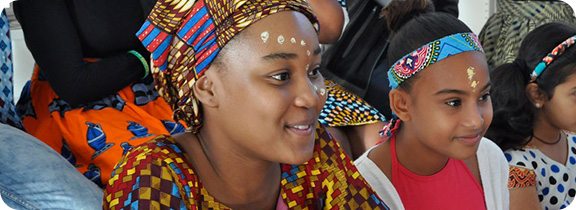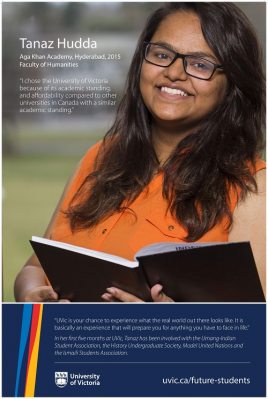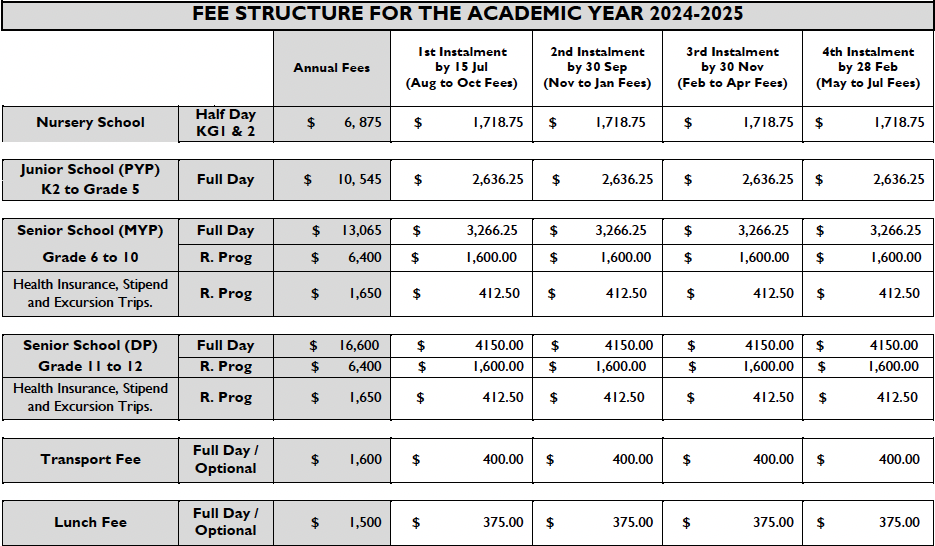His Highness the Aga Khan’s birthday @ Academy – 13 December 2016
We wish our Founder a beautiful day and year full of peace, joy and gratitude and will be celebrating this momentous event with Academy wide activities.
His Highness the Aga Khan's birthday - Thursday 13th December
In honour of our founder's birthday, the Academy will close early. Students & staff will depart at 1pm.
Tanaz Hudda (Class of 2016): Poster girl for University of Victoria
Another lesson that is helping her through university came from one of her Academy teachers. "My teachers were my support system throughout my time at the Academy. One of my favourite teachers who pushed me harder and harder whenever I would perform well or sometimes not so well was Dr. Karuna Arya. I think she instilled this idea in me that one can always do better, even if it appears that you are the best at it. I genuinely cannot forget that lesson as it has helped me so much in the past few months at university." Tanaz also relied on the Academy's staff for help with university choices. "Choosing the kind of university that would suit you the best is always difficult. I had many questions and I had no clue where I would rather go as all universities seemed appealing. For me, the two things that mattered most was affordability and coop opportunities in the field of humanities. I was able to narrow down the list with the help of our University Counsellor, Ms. Pragati, and that made a huge impact on my university choice."
Even though Tanaz has found that Canada can offer her the best career opportunities she believes that giving back to her country and settling down in India is more important. "That connection is what motivates me to study harder and then settle in India to contribute to the greater good of the place I come from. The Academy taught me to strive for excellence, work for the community and be involved in as many extra-curricular activities as possible, as well as never forget where you come from. Giving back to the society has been my goal ever since I joined the Academy and would definitely influence my plans for the future." While at the Academy Tanaz volunteered at a local residential school and helped organise different events for the children there. This and other service projects, such as her volunteering in Nairobi, has convinced Tanaz of the importance of education for India's future, especially in rural schools.
Not only is it important for students to have an education but she also stresses the importance of a 'proper' education. "I have visited many local schools which have neither resources nor adequate training to teach kids what they are supposed to learn. I feel that education is the only chance we have to transform how the nation thinks and that needs to be instilled in rural areas, because India lives in its villages. No education and most of all, improper education could be dangerous in creating false knowledge and sometimes continuing the social evils that exist in a society. Hence, I would focus on making the education system better."
Bernardo Arsénio: Inspired teacher with a mission
Bernardo learned from the Aga Khan Academies that knowledge cannot just be seen as something that starts and ends in a classroom, but that knowledge should also be applicable outside the classroom to solve real problems in real life.
Bernardo Arsénio’s journey to becoming a teacher started when he was in year 11 of his school in Maputo, Mozambique. He had a history teacher who used to make fun of him in the classroom. “He used to come to my desk and ask me what I was doing in his class,” Bernardo says. The teacher did that continuously throughout the year. This affected Bernardo’s performance and motivation to be in that class. He failed the class that year.
“But then I realised I could not let him win… I knew that I am supposed to be in class to learn and not to just let someone de-motivate me because he thinks I shouldn’t be there." Bernardo went to talk to his principal who allowed him to attend the class with the same teacher in spite of failing the class. Bernardo later realised that he had to change his attitude if his teacher did not change his. “So I started attending his class – I used to do all the assignments, tests and homework. I never missed even one class in the year,” he says. Bernardo’s constant efforts were noticed by the teacher – Bernardo even achieved the highest mark that year. In turn, the teacher’s attitude towards him changed for the better.
By giving an example from his life, Bernardo explains why a healthy relationship between a teacher and a student is so important. Having a teacher who does not care and does not motivate the students can have negative consequences. “It almost happened to me and I did not let it happen. I used the negative motivation to change it into a positive one – that inspired me to become a teacher,” he says vehemently.
Bernardo pursued History at Eduardo Mondlane University in Maputo. After graduating with a degree in History and a minor in Information Management in 2015, Bernardo began teaching history in a private school – Centro de Exames de Admissão. Desiring even more teaching skills, Bernardo took a six-month postgraduate course in 2016 at Universidade Pedagógica, specialising in teaching methodology.
After a rigorous selection process, Bernardo was one of six individuals who were given the opportunity for a year-long exchange at the Aga Khan Academy in Mombasa, Kenya as part of the Teacher Preparation Programme. “I was lucky to be in the group to come to Mombasa. That was when my journey started,” he says. At the Aga Khan Academy Mombasa, Bernardo went through three weeks of intensive English training. He humbly says, “We got support from each and every person in the Academy. To reach this level, for me to be able to communicate and to go to class and discuss a certain topic was all because we got so much help. I was challenged in class and felt I could not do it. When you feel you cannot do it, you think you are drowning but find yourself swimming and coming out of water; it was very meaningful.” Bernardo ended up teaching Humanities and History to students in Grades 6 to 9.
When he came to the Aga Khan Academy Mombasa, the first thing Bernardo noticed was how the students played an important role in their education and how they took the responsibility for their own education. He says, “Back at home, the environment is where the teacher owns the knowledge and dominates the classroom.” He also remembers going to a Theory of Knowledge class at the Academy and noticing how the students did not learn by rote but were encouraged to discuss and make sense of what was being taught. The method by which the class was taught thoroughly impressed him.
At the Aga Khan Academy Mombasa, Bernardo mentions how amazed he was to see such cultural and religious diversity. He took note of the unity with which everyone participated in school, for example by focusing on their similarities instead of their differences. He was also impressed with how sports classes were taught at the Academy, utilised as an opportunity for students to get together and learn about their similarities and differences. Bernardo found the people in Mombasa very warm and friendly and he did not feel far away from home.
Bernardo is now back in Mozambique, teaching at the Aga Khan Academy Maputo. He will continue to be a Humanities and History teacher and is helping support the growth of the Academy as they implement the International Baccalaureate (IB) Middle Years Programme. He strongly feels that a teacher should connect what is being taught to real life. For Bernardo, a teacher must motivate and support the students, and should enable students to develop and become better people.

Fee Schedule
Fee schedule for the 2024-2025 academic year.
Click here to download the Academy's fee schedule for the 2024-2025 academic year.
1. One-time, non-refundable admission fee of USD 2,000 is payable for each student enrolling for the first time.
2. One-time, refundable security deposit of USD 1,500 is payable upon acceptance of admission. It is refundable when the student leaves the school as long as the required notice has been given in writing and “No Dues” clearance has been obtained from the school. No interest is paid or payable on this deposit.
3. A sibling discount of 5% of tuition fees will be applicable for second and subsequent children.
4. Tuition fees may be paid for a full year with an early-payment discount of 5%, if paid before 15 July.
5. Tuition fees may be paid in four equal instalments – first, no later than 15 July, second by 30 September, third by 30 November and forth by 28 February of each academic year.
6. A penalty of USD 50 shall be applied on the 1st of every month on any delayed payments made without agreement with the Finance Department. Unexplained delays shall make the students liable to suspension.
7. Tuition fees must be paid within 30 days of admission to secure a place at the Academy.
8. Tuition fees include course fees, the use of essential course books, library books, IT structure, science laboratory equipment, online education and certain classroom supplies.
9. Tuition fees do not include uniform costs.
10. Exam fees for the IB Middle Years Programme and the Diploma Programme will be billed separately based on the actual fee issued by the International Baccalaureate Organization (IBO).
11. Residential fees (USD $6400+$1650) include accommodation, food, health insurance, utilities, pocket allowance, transportation for in city excursions and community support visits.
12. The fees can be paid in US dollars or Mozambican metical. For payments in meticals, the invoice rate will be used. The Academy however reserves the right to change this policy.
13. Parents must provide the Finance Department (finance.maputo@agakhanacademies.org) with the proof of payment made through direct deposit or bank transfer, even if the payment is done by an organisation or a company.
14. If a student wishes to leave the school, one term’s advance notice of withdrawal must be given in writing or, in lieu of notice, one term of the annual fees will be due and payable. School clearance will not be possible until the fee account is settled in full.
15. The Academy reserves the right to withhold results, school leaving certificate, transcripts or any other information and/or document until all outstanding dues are settled in full.
16. Students who have been admitted to the Academy, and can demonstrate need, will be considered for financial aid.
17. The above terms and conditions may be modified, or new terms may apply to reflect changes in the law or our services.
18. For further information, please contact us via email at admissions.maputo@agakhanacademies.org.
Aga Khan Academy Mombasa grooms ethical young voters and leaders to cultivate liberal democracies

Aga Khan Academy win Coast Open junior gala
The Aga Khan Academy Mombasa is featured in The Standard after winning the overall title during the Coast Open junior swimming gala.






